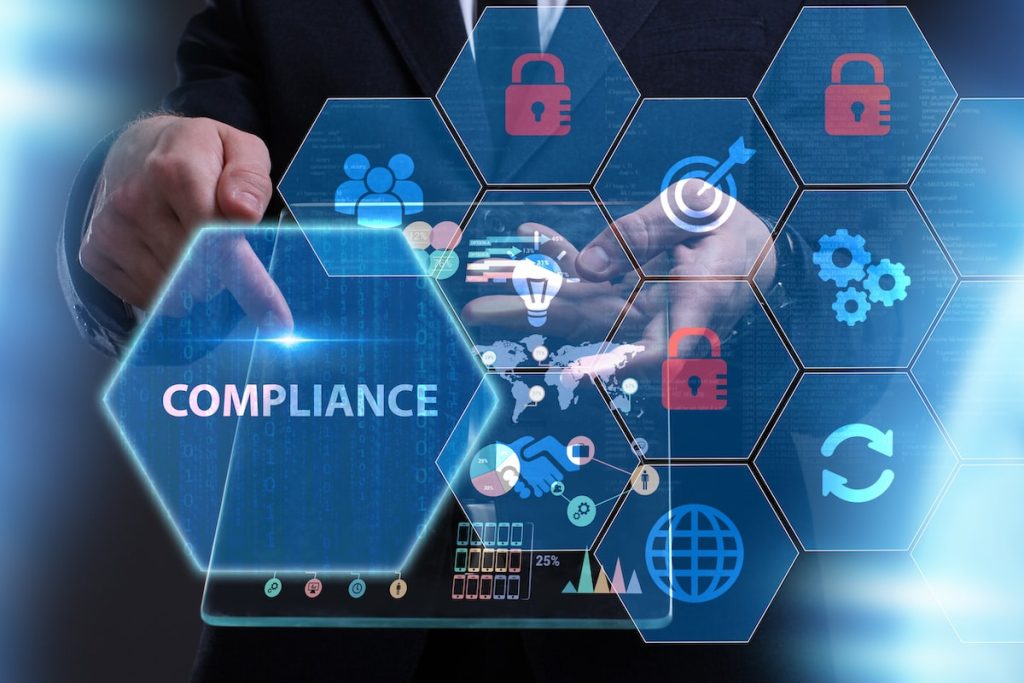Currently, cybersecurity is a topic of vital importance for any company that handles sensitive information. That is why regulatory compliance in cybersecurity becomes an obligation that cannot be ignored. In this article, we’ll talk about the importance of cybersecurity compliance and how our experience keeps you compliant. In addition, we will address the main regulations that companies must comply with in terms of cybersecurity and how we can help you comply with them effectively and efficiently.
How do you keep up to date on cybersecurity Compliance issues?
First of all, it is important to follow the news and developments in the field of cybersecurity. There are numerous websites, blogs, and online publications that focus on cybersecurity compliance and can provide up-to-date information on the latest threats, vulnerabilities, and security fixes.
In addition, it is essential to participate in courses, seminars, and conferences on cybersecurity. These events can provide valuable information on the latest cybersecurity technologies, trends, and best practices.
It is also important to be up-to-date with security updates and patches for the systems and applications used. Many software and operating system vendors release regular updates to address vulnerabilities and other security issues.
Finally, it is important to maintain good digital hygiene, such as using strong passwords, enabling two-factor authentication, taking regular backups, and installing security software on devices.
In short, staying up-to-date on cybersecurity compliance requires being informed, participating in training events, and being aware of cyber security best practices.
What are the cybersecurity compliance standards?
Cybersecurity Compliance standards are a set of practices and measures that must be followed to protect computer systems and the data that is handled in them. These standards include:
1. Use strong passwords: Passwords should be hard to guess and contain a combination of letters, numbers, and symbols. In addition, they must be changed regularly.
2. Keep software up-to-date: It is important to keep operating systems, programs, and applications up-to-date since updates often include security patches that protect against vulnerabilities.
3. Install antivirus software: Antiviruses help detect and remove viruses, Trojans, and other types of malware.
4. Do not open suspicious emails: Caution is necessary when opening emails from unknown or suspicious senders, as they may contain viruses or phishing.
5. Do not download files from unknown sites: Files downloaded from unknown sites may contain viruses or malware.
6. Do not share personal information: It is important not to share personal information online, such as passwords, credit card numbers, or identity information.
7. Use secure connections: It is recommended to use secure connections such as VPN or HTTPS to protect the information that is transmitted online.
In summary, cybersecurity regulations are a series of preventive measures that must be followed to protect computer systems and the data that is handled in them.
What practices can be carried out to maintain a certain degree of security when permanently connected to the Internet?
- Use strong and unique passwords for online accounts.
- Regularly update security software, including antivirus and malware protection software.
- Avoid clicking on suspicious links or downloading files from unknown sources.
- Do not share personal or financial information over the Internet without verifying the authenticity of the source.
- Use a secure and trusted network, such as a virtual private network (VPN), to protect personal information and prevent unauthorized access.
- Set up privacy on social networks and control the information that is shared online.
- Stay informed about the latest online security threats and vulnerabilities.
- Avoid connecting to unsecured public WiFi networks and use mobile data instead.
These practices will help maintain a degree of security online and protect personal and financial information.
What cybersecurity Compliance measures should companies implement?
Companies must implement cybersecurity Compliance measures to protect their information and that of their customers. This implies the adoption of robust security policies and the implementation of protection technologies.
Among the most important cybersecurity measures that companies must adopt are:
1. Data protection: Companies must ensure that their customers’ information is protected by implementing firewalls, antivirus, and other protection measures.
2. Security policies: Companies must establish clear and defined security policies for all employees, including training on security issues and the disclosure of security policies.
3. Software Updates: Companies must ensure that all programs and systems are up to date with the latest software versions to prevent vulnerabilities.
4. Cyber security audit: The company must carry out regular Cyber security audits to detect possible vulnerabilities in their systems and networks.
5. Backups: Companies must make regular backup copies of their data to avoid the loss of information in the event of a cyber attack.
6. Access control: Companies must limit access to data and systems to authorized employees only and must establish strong authentication mechanisms.
7. Protection of mobile devices: Companies must ensure that their employees’ mobile devices are protected with passwords, encryption, and other security measures.
In summary, companies must be proactive in implementing cybersecurity measures to protect their data and that of their customers.
In summary, regulatory compliance in cybersecurity is a crucial task to guarantee the protection of an organization’s data and systems. Businesses can face serious consequences if they fail to comply with applicable laws and regulations, such as fines, reputational damage, and loss of customers.
That is why it is important to have the necessary experience and knowledge to stay in good standing. A team of cybersecurity compliance experts can help companies identify applicable regulations, establish security policies and procedures, conduct risk assessments, and comply with reporting requirements.
In addition, it is essential that companies keep abreast of regulatory changes and best practices in cybersecurity to ensure that their policies and procedures are up-to-date and effective.
In conclusion, cybersecurity compliance is an ongoing process that requires proper planning and management. The expertise of a team of cybersecurity experts can help companies comply with applicable laws and regulations, protect their data and systems, and maintain their reputation and customers.


